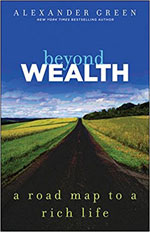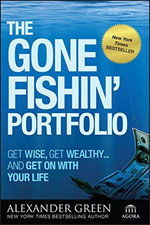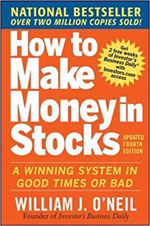by Frank Holmes, CIO, CEO, U.S. Global Investors
August 21, 2017
For more than a decade and a half, my friend Alexander Green has been educating and entertaining investors as editor of numerous popular newsletters, many of which I’ve cited in my own writing.
For those of you subscribed to one or more of his services through the Oxford Club or Investment U, I’m sure you’ll agree that Alex is among the finest financial writers working today. His articles are brimming with intelligence, wisdom, humor and candor—all of which he brings to his public appearances at investment conferences.
Last week it was my pleasure to speak one-on-one with Alex, and together we touched on subjects ranging from our favorite books on investing to the secret lives of millionaires to business moats.
Below are highlights from the interview, but this is only the first of two parts. I’ll conclude it next week in a Frank Talk, which you can subscribe to here.
Enjoy!
You didn’t go into politics or medicine or law. What triggered you to go into the investment world?
At the time, I was living in Orlando. I got a copy of the Orlando Sentinel, and on the front page of the business section was a headline that read: “The average stockbroker in the U.S. makes $187,000 a year.” This was in 1985. Thirty years later, that’s still a substantial amount of money. I remember thinking: “If the average stockbroker makes $187,000, what do the good ones make?”
I crammed the article into my wallet and started telling everyone that I was going to become a stockbroker. Someone then told me that he had just sold a phone system to a broker in Winter Park, Florida, and he was looking to hire someone.
I went out and talked to him and got my first job in the money management business. At the small firm where I started, I was writing research reports and client communications. I discovered I enjoyed research and writing even more than dealing with clients, so when the opportunity arose to become a time financial writer, I took it. That was about 17 years ago.
You’ve published four books so far—The Gone Fishin’ Portfolio, The Secret of Shelter Island, Beyond Wealth and An Embarrassment of Riches. Tell us about the genesis of one or two of them.
I was speaking at a conference in Phoenix about 10 or 12 years ago, and when I came off stage, this older gentleman was waiting for me. He poked his finger at me and said: “Money, money, money. You’ve made a lot of money over the years, but I have to ask, do you ever think about anything else?”
At first I thought he was kidding, but come to find out, he really felt that I thought about nothing but money all day long. I realized then that I write hundreds of columns a year, and virtually every single one is about stocks or bonds, currencies or commodities, interest rates or economic growth. This guy figured I thought about nothing except money and how it’s made.

Of course, we all have our outside interests, and we hope for some kind of balance in our lives. And so when I went back home to Baltimore, I came up with the idea to write something expressing the idea that life isn’t just about making money. I wanted to talk about living a rich life, not just about getting richer.
This led to a column I initially called “Spiritual Wealth.” That name, though, became a problem since the word “spiritual” is one of the most nebulous words in the English language. It can mean any number of different things to different people.
I eventually changed the name to “Beyond Wealth,” which is probably more accurate anyway. It turned into a series of reflections on things that I thought were important—things I’d read or done that I felt were of interest. All of it had very little to do with money. Those articles became one of the most popular things we do, and the eventual book turned out to be a bestseller. I was glad to have found a wider audience out there.
At this year’s FreedomFest conference in Las Vegas, you debated with The New York Times’ Robert Frank about meritocracy and luck. Robert argued that our success in life is mostly due to luck, and you disagreed. Could you talk about that?
A good book to read on this subject is Thomas Stanley’s The Millionaire Next Door. Dr. Stanley spent a lifetime researching the habits and characteristics of the nation’s wealthiest individuals. I might add here that the Spectrum Group revealed that, as of the end of 2016, one out of every nine households in the U.S. had a net worth of $1 million or more. What Dr. Stanley found is that these millionaires have many characteristics in common. Primarily, they do everything in their power to maximize their income and minimize their expenses. They religiously save and invest the difference, then leave the money alone to let it compound for years, if not decades.
That’s how most people become millionaires, regardless of their color, sex or orientation—not by establishing a software company in their garage or making a hit record or playing third base for the Yankees. Most people just work hard, save, invest and compound.
How does that thinking apply to the market?
A few years ago, a guy named Burton Malkiel wrote a book called A Random Walk Down Wall Street. He said that it’s very difficult to beat the market, and even those who do beat it do so because of luck, not skill. So you can see we’re coming to the same sort of argument as Robert Frank.
The independent Hulbert Financial Digest has ranked our Oxford Communiqué in the top 10 investment newsletters in the nation for 16 years now. We beat the market for one year, two years, five years, 10 years, 16 years now. People would say: “Well, you’re just lucky.” It’s a tough thing to argue against. But when enough time goes on, and you continue to beat the market, it should clue someone in that there’s more than luck at play.
Would you say that Warren Buffett is just simply lucky? No, he’s a financial genius who’s taken actions that others haven’t, and he’s reaped the rewards. When Roger Federer won his 19th singles major title recently, nobody said: “Wow, he’s really lucky.”
I admit, everyone has certain amounts of good and bad luck in their personal and professional lives. But to say that luck is the only determining factor is dispiriting to people who have come the furthest. It’s demeaning to say that it’s all luck, not education or hard work or persistence.
Similarly, the people who consistently beat their benchmarks are not just lucky. If you do it long enough, it’s clearly evidence of skill.
Tell us about your “Gone Fishin’” portfolio. How do you look for investment opportunities?

The Gone Fishin’ portfolio is based on the idea that, since nobody knows with any certainty what the economy or market is going to do, it’s sensible to make the foundation of your portfolio a diversified, asset-allocated basket of index funds. You want to make sure your expenses are low and that you have high tax-efficiency and your asset classes are properly represented. Simple and straightforward.
The idea is that there are 10 different asset classes in the portfolio, and you invest according to various percentages: 30 percent in U.S. stocks, 30 percent in foreign stocks, 10 percent each in high-grade bonds, high-yield bonds and Treasuries, and 5 percent each in real estate investment trusts (REITs) and gold shares.
Then, at the end of every year—or on your birthday or anniversary—rebalance the portfolio to bring all the target percentages back into alignment. That reduces your risk because you’re cutting back on what’s depreciated the most and adding to what’s depreciated the least. Over time, this adds to your return while reducing the portfolio’s volatility.
What would you say to someone right now who’s nearing retirement age or who has just retired?
I don’t think enough people think about this, to be honest, Frank. Like you, I’ve been invested in the market for over 30 years, and when I was in my 20s, 30s and 40s, we had horrific selloffs like the stock market crash of ’87, the financial bust that happened when the internet media ended, and then of course the financial crisis. When you’re younger, you realize you’ve still got decades ahead of you, and you can take actions that allow you to be comfortable with whatever your long-term scenario might be.
But as you get older, after you reach the age of 50 or so, it becomes necessary to reevaluate your goals. There’s a bus out there waiting for us as we cross the street. The thing about getting older is, you have to reduce your risk. You’re not going to be working that much longer—or maybe you’re in retirement already—and you just don’t have the time to make it back should there be a market crash. I always say to make your portfolio as conservative as you can live with once you reach this stage of your life. It might crimp your returns, but it’s also going to save your butt if we go into another financial crisis like we did in 2008.
Are there any books on investing you’d like to recommend? How did they help you?

One book I would recommend is How to Make Money in Stocks by William O’Neil, the founder of Investor’s Business Daily. It’s probably 30 years old and has gone through some updates since then. O’Neil is looking for companies that have high sales growth, 25 percent or better compounds in earnings, higher returns on equity, great product innovation, good management and sustainable profit margins.
But to be honest, I think there’s only so much you can learn from books. I say that because you have to learn the hard way and actually feel the terror of a down draft, or fight the instinct to be greedy when you go through a long, full market as we’re in now.
So who do you look to? Where do you get your wisdom and insight?
In the mid-80s, there were three legendary investors: Warren Buffett, Peter Lynch and John Templeton. I started reading and listening to everything I could—all the Berkshire-Hathaway reports, but also tapes of Templeton and Lynch speaking at conferences.
No one knows what the economy or stock market is going to do, but Buffett, Lynch and Templeton knew to identify a business that was selling for a lot less than what it was worth and hold it until the market recognized that value. That sort of became the mantra for me from then on.
It was then that I realized I was not going to play this guessing game about what GDP growth is going to look like, what inflation’s going to be, what the Fed or stock market is going to do. That’s all a distraction. What really matters is individual businesses beating Wall Street expectations. That’s what drives stocks higher in the long term.
I often tell investors at conferences that, if you look back through history, you’d be hard-pressed to find a single example of a company that increased its earnings, quarter over quarter, year after year, and not see its stock tag along. It doesn’t matter what kind of market we’re going through or what kind of economy we’re in, those stocks tend to appreciate really strongly.
One of the publications you edit is the Momentum Alert. Can you tell us what that is?
Speaking of beating Wall Street expectations, this is exactly what we focus on in the Momentum Alert.
These companies tend to be superbly managed, but most important, they have a moat around the business. Let me give you three examples. Blockbuster, Radio Shack and Borders all went bust. There was no way for those companies to protect their margins, whether they were renting video tapes, selling electronic equipment or selling books and CDs. They had nothing to protect them from competition coming in and doing it on a bigger scale or doing it online.
Winning businesses tend to have something that protects margins. That could be a copyright or trademark or patent. Profits attract competition just as honey attracts bears. You’re not going to come across a really profitable niche and find that other people don’t want to exploit it also. You need something to keep them at arm’s length.
Think of the difference between IBM and Apple. IBM made its systems compatible, so other companies—Dell and Compac, for example—came in and made IBM-compatible machines.
No one makes an Apple-compatible machine because Apple never leased its patents to another company. All of those profits for the iMacs, iPhones, iPods and so on all go straight to Apple. That’s the kind of magic that can really help propel a stock up for longer periods of time.
My interview with Alex will conclude in this week’s Frank Talk. I don’t want you to miss it, so make sure you’re subscribed to receive the email alert!
All opinions expressed and data provided are subject to change without notice. Some of these opinions may not be appropriate to every investor. By clicking the link(s) above, you will be directed to a third-party website(s). U.S. Global Investors does not endorse all information supplied by this/these website(s) and is not responsible for its/their content.
Return on equity (ROE) is the amount of net income returned as a percentage of shareholders equity.
Holdings may change daily. Holdings are reported as of the most recent quarter-end. The following securities mentioned in the article were held by one or more accounts managed by U.S. Global Investors as of 6/30/2017: Apple Inc.
This post was originally published at Frank Talk.
Copyright © U.S. Global Investors












